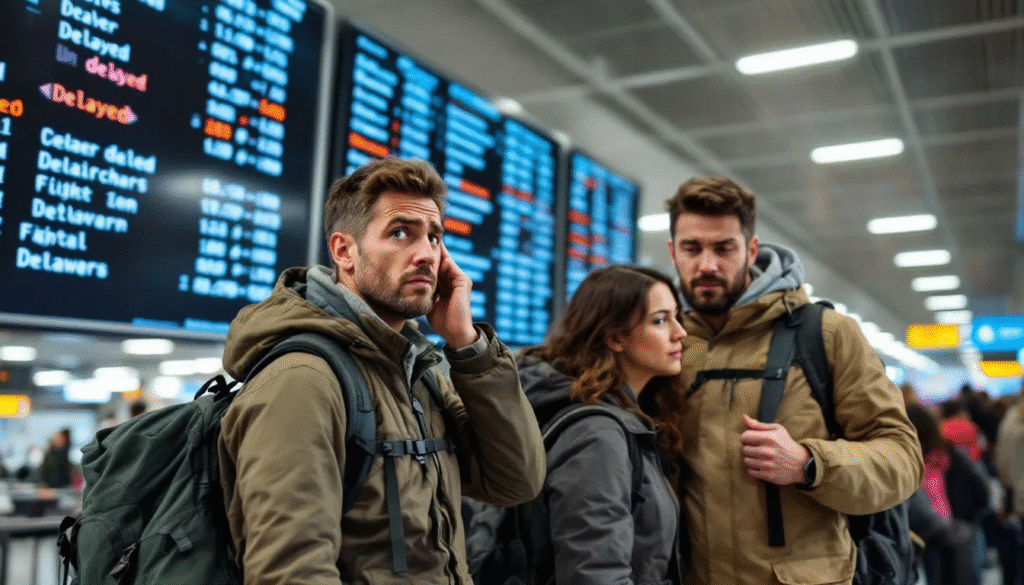Overseas Adventure Travel Financial Problems: What You Need to Know Before You Book
Learn how to spot and avoid overseas adventure travel financial problems so your dream vacation doesn’t turn into a money nightmare.
Key Takeaways
- Adventure travel companies can make getting your money back a nightmare—hiding behind “force majeure” during disasters, dragging their feet with customer service, and sometimes offering vouchers instead of actual refunds.
- Documentation and persistence are crucial when fighting for fair compensation from adventure travel operators
- Research company complaint histories on BBB and review sites before booking expensive adventure trips
Picture this: you’ve poured $27,000 into the adventure of a lifetime—a dream trip to Tasmania. Then, just three days before you’re set to go, Cyclone Jasper hits. Your trip is canceled. You brace yourself for a refund… and instead, the company hands you a $500 voucher. Five hundred. For twenty-seven thousand.
It’s not just disappointing—it’s infuriating. You planned, saved, and dreamed of this experience, only to feel powerless as the company keeps nearly all your money. And while the weather may have been out of anyone’s control, the way the company handled it? That was completely in their hands.
Overseas adventure travel financial problems have become increasingly common, leaving travelers stranded both financially and emotionally. When you’re dealing with companies that specialize in remote destinations and elderly clientele, the stakes get even higher. One person realized they weren’t just dealing with bad weather – they were facing systematic financial practices designed to protect the company’s cash flow at their expense.
The adventure travel industry has a dirty little secret: when things go wrong, many operators will do everything possible to avoid giving you your money back. Instead, they’ll cite force majeure, push travel insurance claims, or simply make the refund process so painful that you’ll eventually give up. But here’s what they don’t want you to know – you have more power than you realize.
Common Financial Issues with Adventure Travel Companies
The overseas adventure travel world draws people ready to spend big for once-in-a-lifetime experiences. But that willingness to pay top dollar also makes travelers an easy target for sketchy financial practices.
Let’s start with the elephant in the room: oat trips and similar high-end adventure tours often cost $10,000 to $30,000 per person. When something goes wrong at this price point, we’re not talking about losing your lunch money – we’re talking about potentially devastating financial losses that can affect retirement savings or once-in-a-lifetime travel dreams.

The December 2023 Cyclone Jasper situation perfectly illustrates how these problems unfold. Multiple adventure tour groups had their Tasmania, Australia, and New Zealand trips cancelled when the cyclone hit. While the weather was certainly beyond anyone’s control, what happened next revealed the true character of different tour companies.
Some companies immediately offered full refunds and worked diligently to accommodate travelers on future trips. Others, however, pointed to their force majeure clauses and offered compensation so inadequate it bordered on insulting. When a company offers a $500 voucher for a $27,000 trip cancellation, that’s not force majeure – that’s a business model designed to keep your money regardless of circumstances.
Travelers often run into a handful of recurring financial headaches: delayed or denied refunds, being nudged to accept vouchers instead of actual cash, surprise “processing fees” that never came up at booking, and the maddening experience of speaking to customer service only to get a different answer each time.
The COVID-19 pandemic made all of this even worse. Many companies suddenly changed their refund policies in the middle of the crisis—sometimes applying the new rules retroactively to bookings people had already made—leaving travelers frustrated, confused, and out of pocket.
The Force Majeure Defense: When Companies Avoid Responsibility
Force majeure – those fancy French words that basically mean “superior force” – has become the escape hatch of choice for adventure travel companies looking to avoid financial responsibility. But here’s what most travelers don’t realize: force majeure doesn’t automatically absolve a company of all obligations.
True force majeure applies when extraordinary circumstances make it impossible for a company to fulfill their contractual obligations, and they’ve taken all reasonable steps to minimize the impact on customers. The key phrase here is “reasonable steps.”
Let’s go back to our Cyclone Jasper example. The cyclone itself was clearly a force majeure event – no one can control the weather. However, what happened after the cancellation is where many companies showed their true colors. If a company immediately offers adequate compensation or reasonable alternatives, they’re likely acting in good faith. If they offer a token voucher and cite force majeure as justification, they’re probably trying to use the natural disaster as cover for keeping your money.
One traveler shared their experience with harriet lewis, a customer service representative who initially promised a full refund within several days, only to later claim that force majeure meant they were only entitled to a small voucher. When the traveler pointed out that other companies affected by the same cyclone had provided full refunds, suddenly the company’s position became much less certain.
The red flag here isn’t the initial cancellation – it’s the inadequate response. When a company’s compensation offer is dramatically out of proportion to the loss (like that $500 voucher for a $27,000 trip), it suggests they’re using force majeure as a convenient excuse rather than a legitimate legal defense.
Smart travelers should always ask themselves: “Is this company doing everything reasonably possible to make this right, or are they hiding behind legal language to keep my money?” The answer usually becomes clear pretty quickly.
Refund Battles and Customer Service Failures
If you’ve ever tried to get a refund from a travel company that’s given you trouble, you know it can feel like they’re actively trying to make the process as frustrating as possible. And honestly? Sometimes they really are.
The refund battle typically starts innocently enough. You submit your refund request through the proper channels, and the company confirms they received it. Then the fun begins. First, they’ll tell you to wait several days for processing. When that deadline passes, they’ll say there’s a backlog. When you call back, a different agent will tell you something completely different.
One traveler documented their experience over six months of trying to get a refund for a cancelled trip. They spoke with agents who promised callbacks that never came, received conflicting information about refund timelines, and were repeatedly told that their “verification successful waiting” status meant the refund was being processed, only to discover weeks later that no actual progress had been made.

Red Flags in Customer Service Interactions
The most telling red flag is when customer service agents provide different information each time you contact them. This isn’t incompetence – it’s often a deliberate strategy to exhaust your patience and make you give up on your refund request.
Another major red flag is pressure to accept vouchers instead of cash refunds. Companies in financial trouble often push vouchers because it allows them to keep your cash for their immediate operations while giving you a promise they may not be able to honor later. When an agent tells you that a voucher is “just as good as cash” or that cash refunds “aren’t available” for your situation, you’re probably dealing with a company that needs your money more than they need your business.
Pay attention to how quickly agents try to shift blame to external factors. While weather, political situations, and vendor problems can certainly affect travel, a reputable company will focus on solutions rather than excuses. If every conversation turns into a lengthy explanation of why nothing is their fault, you’re probably not going to get satisfaction through normal customer service channels.
The most sophisticated companies have perfected the art of seeming helpful while accomplishing nothing. They’ll assign you a case number, promise to “escalate” your concern, and schedule follow-up calls that somehow never quite resolve anything. Meanwhile, your refund request sits in limbo while they hope you’ll eventually accept whatever inadequate offer they’ve made.
Protecting Your Investment Before You Travel
The best defense against overseas adventure travel financial problems is thorough research before you book. This means going beyond the glossy brochures and marketing materials to investigate the company’s actual track record with customers.
Start with the better business bureau. Look not just at the overall rating, but at the pattern of complaints. Even if a company looks good with a high BBB rating, a sudden flood of refund complaints is a serious warning sign. Watch closely how they handle issues—are they actually trying to fix problems, or just sending cookie-cutter replies that solve nothing?
Here’s a stark example: Overseas Adventure Travel had over 300 complaints on the BBB in a recent period, while a similar company serving the same type of travelers had only 2. That kind of gap doesn’t happen by accident—it tells you exactly how a company treats its customers when things go wrong.
TripAdvisor and other review sites can be useful. Don’t just rely on the star ratings. Dive into the reviews themselves. Take note of their recurring issues like cancellations, refund delays, or poor customer service because these patterns reveal problems that stars alone can’t.
When you’re reading the fine print, really focus on the refund policies and force majeure clauses. If the language feels deliberately tricky or clearly favors the company, treat it as a major red flag—don’t hand over your hard-earned money until you’re sure they’ll play fair. REMEMBER: A trustworthy company will have clear, fair refund policies that anyone can understand without needing a law degree.
Consider your payment method carefully. Credit cards offer the best protection through chargeback rights, while wire transfers and checks offer virtually no recourse if problems arise. Some companies offer discounts for paying the full amount far in advance, but these “pre paid” discounts can be a red flag if the company is experiencing cash flow problems.

Travel insurance deserves special consideration, but not all policies are created equal. Standard trip insurance might not cover supplier default or gross negligence by tour operators. Look for policies that include “Cancel for Any Reason” coverage or specific supplier default protection, though these options typically cost more.
Travel Security Measures
- Understand the importance of safeguarding your financial accounts while traveling. Tips on notifying your bank and ensuring you’re secure during your trips.
- Purchase comprehensive travel insurance to cover medical emergencies and trip interruptions.
- Keep copies of essential documents in separate locations for security during travel.
- Inform your bank and credit card companies about your travel plans. This will help prevent account freezes, especially if an unusual event or activity takes place.
Fighting Back: Steps to Take When Problems Arise
When prevention fails and you find yourself in a dispute with an adventure travel company, documentation becomes your best friend. Start keeping detailed records from the moment problems arise – dates, times, names of people you spoke with, and exact quotes of what they told you.
Keep a paper trail—email is your best friend. It’s much harder for a company to argue with a written record than with vague verbal promises, so try to get any commitments in writing whenever possible.
When things aren’t moving, escalate strategically. Start with regular customer service, but if that goes nowhere, ask for a supervisor or manager. If you’re still stuck, request contact info for the executive team.
Persistence pays off. One traveler, frustrated after weeks of stonewalling, emailed the company president directly with a clear, professional case. That’s when things finally started moving toward a full refund. Within days, they received a call from traveler relations offering a satisfactory resolution.

Filing complaints with the BBB, your state attorney general, and travel organizations not only adds pressure on the company but also creates a paper trail that can help both your case and future travelers.
Legal Considerations and Small Claims Court
If you’re facing several thousand dollars in losses, legal action may be worth exploring. Small claims court is often ideal for mid-range trip costs—it’s relatively inexpensive, and you usually don’t need a lawyer.
The trick is showing that the company was negligent, not just hiding behind a force majeure excuse. Keep everything—emails, promises, and records of inadequate compensation or broken commitments—because strong documentation can make or break your case. For example, one traveler fought a $500 voucher offer for a $27,000 cancelled trip, proved the company acted in bad faith, and won a full refund plus costs.
Before diving into legal action, weigh the time, stress, and uncertain outcome against what you might get back. For big financial losses, having solid evidence usually makes it worth the effort.
Alternative Solutions and Future Prevention
Working with an experienced travel agent can provide extra protection. Agents often have established relationships with companies and know which operators handle disruptions responsibly.
When booking future trips, prioritize companies with a history of good customer service and fair problem-solving. Repeat-friendly operators are usually more trustworthy when issues arise.
Setting up a personal emergency fund for travel mishaps gives you peace of mind and financial flexibility if problems come up—covering things like unexpected hotel stays or alternative transport while you wait for a resolution.
Some travelers have found success in joining travel clubs or organizations that provide advocacy services for their members. These groups often have more leverage with tour companies than individual travelers and can provide valuable advice when disputes arise.
Consider diversifying your adventure travel experiences across multiple companies rather than becoming too dependent on a single operator. This approach reduces your risk if one company experiences financial difficulties or changes their policies in ways that don’t align with your needs.
FAQ
Can adventure travel companies legally keep my money if a natural disaster cancels my trip?
Not necessarily. While force majeure clauses exist, companies still have obligations to provide reasonable alternatives or refunds. If they offer inadequate compensation (like a $500 voucher for a $27,000 trip), it may indicate negligence rather than legitimate force majeure. Document everything and consider that their response to the cancellation may be more important legally than the cancellation itself.
How long should I wait for a refund before taking further action?
Most legitimate refunds should process within 30-60 days maximum. If a company promises a specific timeframe and misses it repeatedly, or if they stop responding to communications entirely, it’s time to escalate to management, file BBB complaints, or consider legal action. Don’t let them string you along indefinitely with vague promises about “processing delays.”
What’s the difference between a travel voucher and a cash refund, and why does it matter?
Vouchers tie you to the same company and often have expiration dates and restrictions that may make them difficult or impossible to use. Cash refunds give you freedom to book with more reliable operators. Companies in financial trouble often push vouchers to preserve cash flow at your expense, so insisting on cash refunds can actually serve as an early warning system for company financial problems.
Will travel insurance cover problems with adventure tour operators?
It depends entirely on your policy. Standard travel insurance may not cover supplier default or gross negligence by tour operators. Look for policies with “Cancel for Any Reason” coverage or specific supplier default protection, though these cost significantly more. Read the fine print carefully, as many policies exclude coverage when the traveler accepts vouchers instead of demanding cash refunds.
How can I research an adventure travel company’s financial stability before booking?
Check BBB ratings and complaint patterns, focusing on recent reviews about refund and customer service issues. Read TripAdvisor reviews carefully, especially negative ones mentioning financial problems. Search online for news about lawsuits or financial difficulties. Verify they’re members of professional travel organizations with consumer protection standards. Compare their complaint volume to similar companies – dramatic differences often indicate systematic problems rather than isolated incidents.







